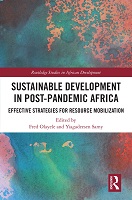Chapter 4 Enhancing Gender-Responsive Financing in Africa
A Sustainable Development Perspective
| dc.contributor.author | Ufodike, Akolisa | |
| dc.contributor.author | Ally, Susanna | |
| dc.date.accessioned | 2023-11-20T13:14:56Z | |
| dc.date.available | 2023-11-20T13:14:56Z | |
| dc.date.issued | 2023 | |
| dc.identifier.uri | https://library.oapen.org/handle/20.500.12657/85257 | |
| dc.description.abstract | African women experience numerous barriers in society due to a lack of access to education, health, property rights, and economic tools for generating income and achieving prosperity. Moreover, within the current global financial system, African women entrepreneurs are limited by their lack of financial literacy, creditworthiness, and financial institutions’ restrictive criteria for investments. By conducting a multiple case study analysis highlighting the importance of the private sector in providing key financial instruments, this chapter investigates the challenges faced by African women entrepreneurs and explores the best practices for empowering them to reach their potential that could lead to better societal outcomes in alignment with the United Nations’ Sustainable Development Goals in a post-COVID-19 world. | en_US |
| dc.language | English | en_US |
| dc.subject.other | Education, Access to education , Property Rights, Global Financial Systems , United Nations’ Sustainable Development Goals | en_US |
| dc.title | Chapter 4 Enhancing Gender-Responsive Financing in Africa | en_US |
| dc.title.alternative | A Sustainable Development Perspective | en_US |
| dc.type | chapter | |
| oapen.identifier.doi | 10.4324/9781003185062-4 | en_US |
| oapen.relation.isPublishedBy | 7b3c7b10-5b1e-40b3-860e-c6dd5197f0bb | en_US |
| oapen.relation.isPartOfBook | f44af893-f8e7-4aff-af20-5a67f600545a | en_US |
| oapen.relation.isFundedBy | b9519564-684b-4f6e-90c1-da4c9b00190c | en_US |
| oapen.relation.isbn | 9781032027609 | en_US |
| oapen.relation.isbn | 9781032027616 | en_US |
| oapen.imprint | Routledge | en_US |
| oapen.pages | 21 | en_US |
| peerreview.anonymity | Single-anonymised | |
| peerreview.id | bc80075c-96cc-4740-a9f3-a234bc2598f1 | |
| peerreview.open.review | No | |
| peerreview.publish.responsibility | Publisher | |
| peerreview.review.stage | Pre-publication | |
| peerreview.review.type | Proposal | |
| peerreview.reviewer.type | Internal editor | |
| peerreview.reviewer.type | External peer reviewer | |
| peerreview.title | Proposal review |

